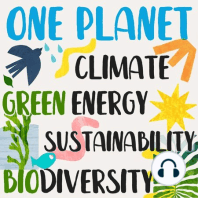20 min listen

PABLO HOFFMAN - Whitley Award-winning Conservationist - Exec. Director & Co-Founder of Sociedade Chauá
PABLO HOFFMAN - Whitley Award-winning Conservationist - Exec. Director & Co-Founder of Sociedade Chauá
ratings:
Length:
34 minutes
Released:
Jun 1, 2023
Format:
Podcast episode
Description
Pablo Hoffman has always been passionate about plants and natural ecosystems, with special appreciation for research and dissemination with practical results for the production and conservation of native species. Pablo graduated in Forestry at the Federal University of Paraná (UFPR) 2002, had his Master’s in Forestry – UFPR 2014, currently he is a PhD candidate in Forestry. One of the Founders of the Sociedade Chauá, Pablo has been a board member since 2008. Currently is the Executive Director as well Coordinator of the Chauá Nursery of native species. A specialist in conservation, propagation and restoration of rare and endangered species of the Araucaria Forest, whose projects are locally and internationally recognized. As a result of Sociedade’s Chauá efforts to save endangered plant species Pablo was awarded the Marsh Award (2018), Whitley Award (2022), and Guardians of Nature (2022). As a life choice, working with conservation of rare and endangered plant species is the lifeblood of his personal and professional aspirations, to leave a positive legacy for the next generations, keeping the ecosystems alive with humans as part of it."I understood that the Araucaria Forest ecosystem was really degraded and needed conservation to protect the plant species, the Araucaria Forest ecosystem where I live used to cover around 40% of the land. And nowadays there's less than 1% left of good, quality remnants of forest. So it's almost nothing. So you can imagine what happens with the plant species and also animal species. But nowadays the conversion of natural areas, even grassland savannahs are forced into agribusiness areas that have the most impact, as they have the capacity of using machines, and tractors for converting these areas, using more and more fertilizers, agrichemicals, and pesticides that can destroy one hector in less than one hour with their tractors and machines. It will take like 50 years to a hundred years to recover - if it recovers. Depending on how many species we still have left the dispersers, pollinators, and the other actors of the ecosystem to aid in the recovery."www.sociedadechaua.orgwww.creativeprocess.info www.oneplanetpodcast.orgIG www.instagram.com/creativeprocesspodcast
Released:
Jun 1, 2023
Format:
Podcast episode
Titles in the series (100)
(Highlights) Noah Wilson-Rich · Co-founder/CEO, The Best Bees Company, Largest US Beekeeping service…: Interviewed by Mia Funk & Sydney Field · Associate Podcast Producer Sydney Field by One Planet Podcast · Climate Change, Politics, Sustainability, Environmental Solutions, Renewable Energy, Activism, Biodiversity, Carbon Footprint, Wildlife, Regenerative Agriculture, Circular Economy, Extinction, Net-Zero